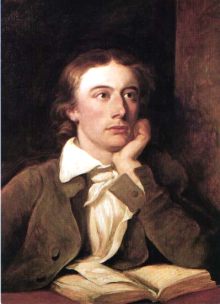Janet Kenny
Keats
When only tortured language wrings the truth
from placid prose, I turn my mind to Keats
who with the flagrant confidence of youth
exploited every word within his reach.
Some supple sense of daring let him slip
between the heavy pieties and shrill
excesses of contemporaries — grip
the bones of prosody with elfin skill.
Where are the ancient soft embalmers now
and where eternal lids? Our mind’s cage-door
has clanged and left us all not knowing how
to visit mystery. We are the poor
who must use plastic when we long for wood,
take Prozac when we weep for some relief
from what we know is real, in case we should
seem self-indulgent, giving way to grief
when all about us suffer — maybe more
than we who speak. Unsure of how to show
the horror in our heads without the score —
that raga for the end of human woe
we have no right to commandeer. The shared
enormity of what we face must dwarf
our individual commentary, pared
to blandness we must chatter about golf
and cooking, our vacation in remote
locations where the language is unique,
the bread is made of millet, and a goat
is tethered in our room. Beware of bleak
reminders that, like Keats, we cannot sleep,
without a draft of something that will ward
our oilëd minds from dangers. Angry sheep
that leap in endless file, a growing hoard
of memories. I thankfully return
to Keats with his last sonnet when he knows
the permanence of moments; his nocturne
is fixed like dawn upon the alpine snows.
Quotes from “To Sleep”; “Last Sonnet”; “Fancy”
Companion Piece
 During a longish life I have seen certain changes which have caused me to write this poem. I was reading Keats at the time. His pitifully short and difficult life had some consolations which our medically extended lives no longer have. The richness and unashamed passion of his language grew from a less analysed and more felt life. During a longish life I have seen certain changes which have caused me to write this poem. I was reading Keats at the time. His pitifully short and difficult life had some consolations which our medically extended lives no longer have. The richness and unashamed passion of his language grew from a less analysed and more felt life.
Mass communication and population pressure have standardised many of our experiences. Literature has become more inclusive. Heightened language is rarely considered to be acceptable. “Over-written” is the epithet often used to describe colourful or expressive writing. Critics often say that such writing is “unnatural”.
Market forces and technology have increasingly caused a loss of intimacy between the artist and his or her tools. Music is amplified and recorded. Eccentricity is less likely to survive.
Popular science and television have informed people of the dangers of nuclear weapons and global warming. We see chaos, cruelty and destruction on our TV screens.
Urban life is increasingly divorced from nature. Food is becoming globalised at the expense of regional differences.
Human expansion has caused the disappearance of many species of birds, animals and plants. Vanishing wildlife is remotely experienced on television screens. Timber is now a luxury. Plastic and chipboard are increasingly used for ordinary domestic furniture. Population pressure has polluted the seas and rendered many traditionally eaten fish unsafe, on top of which over-fishing has threatened the survival of many fish species.
And then there is the inescapable fact of each individual’s ultimate death. That is something we still share with Keats.
We may not lament or express our fear because every single human shares our fate. So we suppress our grief and hide in trivial pursuits. We dare not pause because then reality crowds in on us.
The natural world, which includes humans, is for many the great consolation. Moments of amazement and beauty bring rare tranquility and peace. Without these moments we almost miss the point of being alive and many people near the end of life wonder why they had failed to realise what it is that matters most.
Janet Kenny has metamorphosed from painter to classical singer to anti-nuclear activist, researcher, writer, illustrator and poet. Started in New Zealand and zigzagged across the globe to finally settle in Australia. She has published fairly widely as a poet.
|